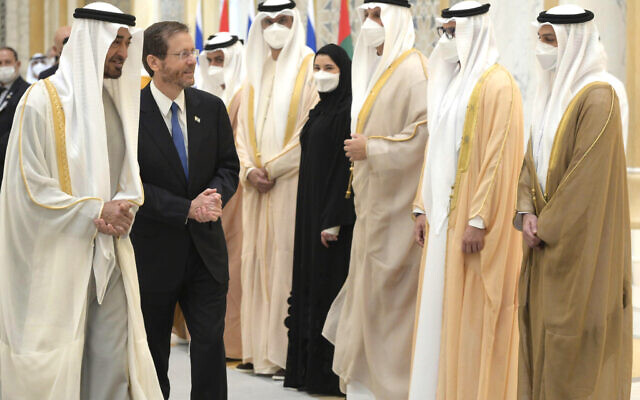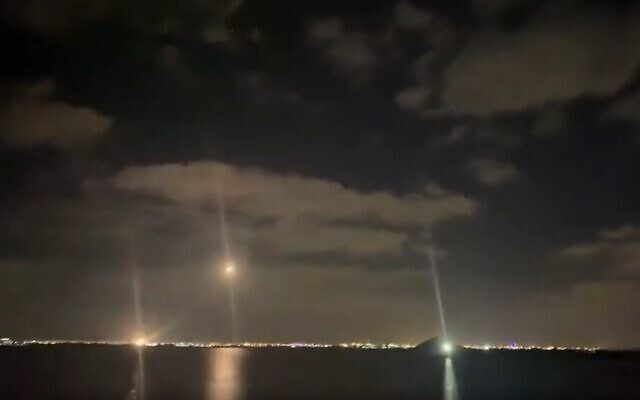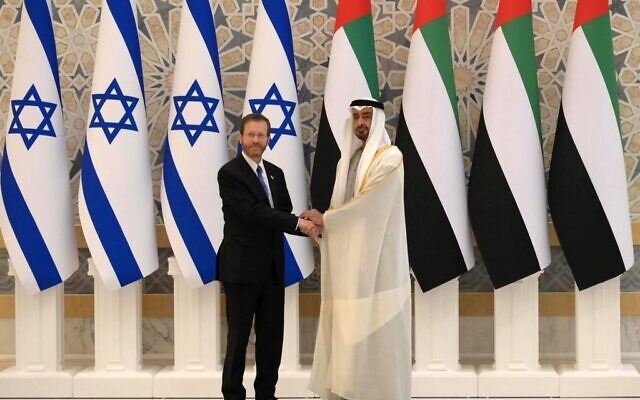Emirati defense ministry says projectile intercepted; no injuries or damage reported in latest attack by Iran-backed rebels; president’s spokesman says visit to continue as planned

The United Arab Emirates on Sunday announced it shot down a ballistic missile fired toward the Gulf state, as Israel’s President Isaac Herzog was making a historic visit to Abu Dhabi.
A statement from Herzog’s spokesman said the president was informed of the incident and that his visit was expected to proceed as planned. “There was not, and is not, any danger posed to the president and his entourage,” the statement said.
The UAE’s defense ministry said “air defenses intercepted and destroyed a ballistic missile launched by the Houthi terrorist group towards the country.” There were no immediate reports of injuries or damage, with the ministry saying the remnants of the missile fell in unpopulated areas after it was intercepted.
Earlier, a spokesman for the Iran-backed group said the Yemeni rebels would soon disclose details about a military operation deep in the UAE.
The incident marks the third attack on the Emirates this month, with three foreign workers killed in the first assault on January 17 and the second a week later that was intercepted.
📍🚨#UAE – Houthis 2 ballistic missiles intercepted by the UAE air defense syatem.
The evacuation of commercial malls in Abu Dhabi has been reported. pic.twitter.com/W2C9oBO4ue— Special Solution (@SpecSolution) January 30, 2022
The UAE is part of a Saudi-led military coalition that supports Yemen’s government against the Iran-backed Houthis.
In 2019, the UAE withdrew its troops from Yemen but remains an influential player.
Yemen’s civil war began in 2014 when the Houthis seized the capital Sanaa, prompting Saudi-led forces to intervene to prop up the government the following year.
Already, the country’s top prosecutor has threatened that people who film or post images of such an incident would face criminal charges in the UAE, an autocratic federation of seven sheikhdoms on the Arabian Peninsula. That makes reporting on such incidents even more complicated for journalists.
In the absence of those videos, the Emirati Defense Ministry released black-and-white footage it described as showing the destruction of a ballistic missile launcher in Yemen’s al-Jawf province some 30 minutes after the attack. Another attack last week saw a similar strike launched on al-Jawf in the minutes after, leading analysts to suggest the Emiratis may be receiving intelligence assistance from the West for its strikes.
Al-Jawf is some 1,350 kilometers (840 miles) southwest of Abu Dhabi.

The latest attack came after Herzog and his wife landed in Abu Dhabi on Sunday morning for the first-ever official visit by an Israeli president to the United Arab Emirates.
The president and first lady were given a festive welcome by UAE’s Foreign Minister Sheikh Abdullah bin Zayed, which included the playing of both countries’ national anthems, and a 21-gun salute. Afterward, they held a working meeting, then had lunch with members of Herzog’s delegation.

Later he met with the UAE’s powerful Crown Prince Sheikh Mohamed bin Zayed for over two hours. Afterward, Bin Zayed invited Herzog for an unscheduled follow-up personal meeting at his private palace.
Bin Zayed — the UAE’s de facto leader — thanked Herzog for Israel’s condemnation of the Houthi attacks.
Last week Prime Minister Naftali Bennett “ordered the Israeli security establishment to provide their counterparts in the UAE with any assistance” that could help to protect against future attacks.
“Israel stands with the UAE,” he wrote in a letter to Bin Zayed. “I stand with [Crown Prince] Mohammed bin Zayed. The world should stand against terror.”
Last Wednesday, the US State Department updated its travel advisory for the Gulf state, warning Americans against visiting because of the missile and drone threat.
“The possibility of attacks affecting US citizens and interests in the Gulf and Arabian Peninsula remains an ongoing, serious concern,” the travel advisory said. “Rebel groups operating in Yemen have stated an intent to attack neighboring countries, including the UAE, using missiles and drones. Recent missile and drone attacks targeted populated areas and civilian infrastructure.”
Jason Brodsky, policy director at United Against a Nuclear Iran, told The Times of Israel before Sunday’s attack, that the Expo, especially during Israel day and Herzog’s visit, could present an enticing target for Houthi rebels.

“They’re trying to increase the cost for the Emirates in that way,” he said. “They are seeking to make the Emirates an inhospitable environment for the international business world. Targeting the Dubai Expo would be consistent with that vision.”
Nevertheless, Herzog’s visit was going ahead as planned despite the missile attack.
Herzog is slated to visit Dubai, and will meet with Dubai ruler Prime Minister Sheikh Mohammed bin Rashid al-Maktoum, Tolerance Minister Sheikh Nahyan bin Mubarak, who is Expo 2020 Dubai’s commissioner-general, and Emirati business leaders.
The president will also open Israel’s national day at Dubai Expo 2020 on Monday.
Israel and the UAE forged ties in the United States-brokered Abraham Accords in 2020, bringing over a decade of covert contacts into the open, and have seen their relationship flourish since then.
As reported by The Times of Israel
